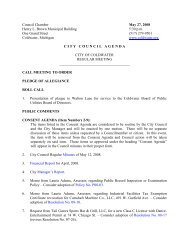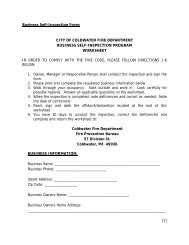There is a cost for filing a small claim,which includes postage or service fees; youwill need to contact the court for thisinformation. Be sure to bring this amount withyou when you file your claim. The amount canbe made a part of the judgment if the judgedecides in your favor.After you have filed your claim, the courtwill notify the other party that you have filed aclaim against them and the date they are to bein court. The defendant may respond beforethe hearing.The defendant may offer to settle out ofcourt after learning you have filed a suit. If yousettle the matter out of court, you can eithervoluntarily dismiss your lawsuit or obtain ajudgment. If you want an enforceable judgment,the terms of your agreement must be spelledout in writing and signed by both you and thedefendant. A copy of the agreement must befiled with the court.Q4 What happens when you are sued inSmall Claims Court?If you are served with court papers fromthe small claims court, you are called thedefendant. You have several ways to respondto the affidavit and claim you have received.If you want to deny the claim, you musteither answer the complaint before the hearingdate or appear in court on the hearing date,bringing with you any evidence you have tosupport your denial. If you want an attorney torepresent you, you must tell the court at orbefore the hearing; the case will be transferredfrom small claims court to the regular districtcourt.If you have a claim against the person whois suing you, you can also file a counterclaim.Your written counterclaim should be filed withthe court and served by first-class mail to theperson suing you.If you fail to appear for the hearing, thecourt may enter a default judgment againstyou. This means the judge may grant ajudgment for the plaintiff without hearing yourstatement.The entry of a judgment may appear onyour credit report.Q5 Is it necessary to prepare forthe hearing?On the hearing date, any of the followingmay happen:1. If both the person filing the lawsuit andthe defendant appear, the judge mayrecommend that the parties go to mediationand the case may be adjourned. If either partydoes not want to try mediation, the hearingmay proceed.2. If the party filing the lawsuit does notappear, and the defendant does appear, thecase will be dismissed.3. If the defendant does not appear, theperson filing the lawsuit may ask for a“default” judgment. This means that, if thejudge decides you have a good claim, you canobtain a judgment without a hearing since theperson or business you are suing did notappear to challenge your claim.When you go to court for a hearing, takewith you all the evidence you believe provesyour claim. This might include a sales receipt,guarantee, lease, contract, or accident report.If a damaged article is too big to bring withyou, photographs can be presented asevidence. Any witnesses you would like tospeak on your behalf should appear in court aswell.Remember, a judge or attorney magistratewill hear a small claims case; you have noright to a jury trial, and the hearing will not berecorded.Either party has the right to ask that thecase be heard in the general district court. Thecourt will notify the person filing the lawsuit ifthe defendant makes such a request. In thedistrict court, both you and the defendanthave the right to be represented by anattorney. Whoever loses the case may be askedto pay for court costs and attorney fees.Unless defendants are prepared for the extraexpense, they usually agree to have thehearing in the small claims division.24
Q6 What happens at the hearing?The hearing will usually take place at thecourt where you filed your claim. It isimportant to be there on time; if you filed thelawsuit and are not in court when your case iscalled, the case may be dismissed. If you arethe defendant and are not in court when yourcase is called, a default judgment may beentered against you. Bring all of your relevantpapers or other evidence and make sure yourwitnesses will be on time.The court clerk will call your case and youand the defendant will appear before the judgeor magistrate. The judge will ask you to stateyour claim. Take your time and tell whathappened in your own words and why youthink the person or business you are suingowes you money. Show the judge yourevidence and introduce any witnesses youhave. The witnesses will be allowed to tell thejudge what they know about the case.When you have finished, the person orbusiness you are suing will have anopportunity to explain their side of the case.Listen carefully. If you think the defendant isleaving something out or is misstating facts, besure to tell the judge.A judge’s decision is final. Neither you northe defendant can appeal to a higher courtonce the judge has made a decision in thesmall claims division; although, on petition byeither party, the same judge may reopen thecase in the small claims division. Either partymay appeal a magistrate’s decision. The casewould be rescheduled before a judge and bothparties would explain their case again.Q7 If you win, how do you collectyour money?If you obtain a judgment against thedefendant, the court will provide instructionsregarding post-judgment collections. Thedefendant may pay the judgment plus courtcosts immediately after the hearing, but if heor she does not have the money to pay rightaway, the judge may allow a reasonable time topay and may set up a payment schedule. If thedefendant fails to pay the judgment whenordered, you must go back to the court andfile additional papers to collect on thejudgment by having their wages or bankaccount garnished or property seized. Thiscannot occur until 21 days after the judgmentis entered. As part of the judgment, thedefendant must provide information to thecourt that can be used in post-judgmentcollection efforts.The Small Claims Court section was supplied by theState Court Administrative Office under a grant from theState Justice Institute and in cooperation with the StateBar of Michigan. Points of view expressed are those ofthe Michigan State Court Administrative Office and donot necessarily reflect the official position or policies ofthe State Bar or the State Justice Institute. TP-2 (12/99)25
- Page 1 and 2: TenantsandLandlordsa practical guid
- Page 3: Table of ContentsCreating and Termi
- Page 7 and 8: Note: Two copies of an inventory ch
- Page 9 and 10: The Security DepositThe security de
- Page 12: C. Security Deposit TimelineSecurit
- Page 15 and 16: Eviction ProceedingsIf the landlord
- Page 17 and 18: ) Copy of the Notice of Eviction (a
- Page 19 and 20: the problem. If a portion of the re
- Page 21: C. Eviction Timeline (continued)Evi
- Page 24 and 25: KENT, Isabella, Lake, Mecosta, Mont
- Page 28 and 29: Repair and MaintenanceRepair and ma
- Page 30 and 31: › If the rent, or a portion of it
- Page 33 and 34: AppendicesSample Residential Lease
- Page 35 and 36: (c)(c)(d)(d)(e)(e)(f)(f)(g)(g)(h)(h
- Page 37 and 38: Sample Residential Lease Agreement
- Page 39 and 40: Sample Residential Sublease Agreeme
- Page 41 and 42: Sample Roommate Agreement (page 2 o
- Page 43 and 44: Sample Inventory ChecklistInventory
- Page 45 and 46: The following are sample letters wh
- Page 47 and 48: Samples of Tenant’s Letters to La
- Page 49 and 50: Samples of Tenant’s Letters to La
- Page 51 and 52: Samples of Landlord’s Letters to
- Page 53: Approved, SCAOSTATE OF MICHIGANJUDI
- Page 56 and 57: Approved, SCAOSTATE OF MICHIGANNOTI
- Page 58 and 59: Approved, SCAOSTATE OF MICHIGANDEMA
- Page 60 and 61: Approved, SCAOCourt addressSTATE OF
- Page 63 and 64: PROOF OF SERVICESUMMONSLandlord-Ten
- Page 65 and 66: Approved, SCAOCourt addressSTATE OF
- Page 67 and 68: The information in this publication





